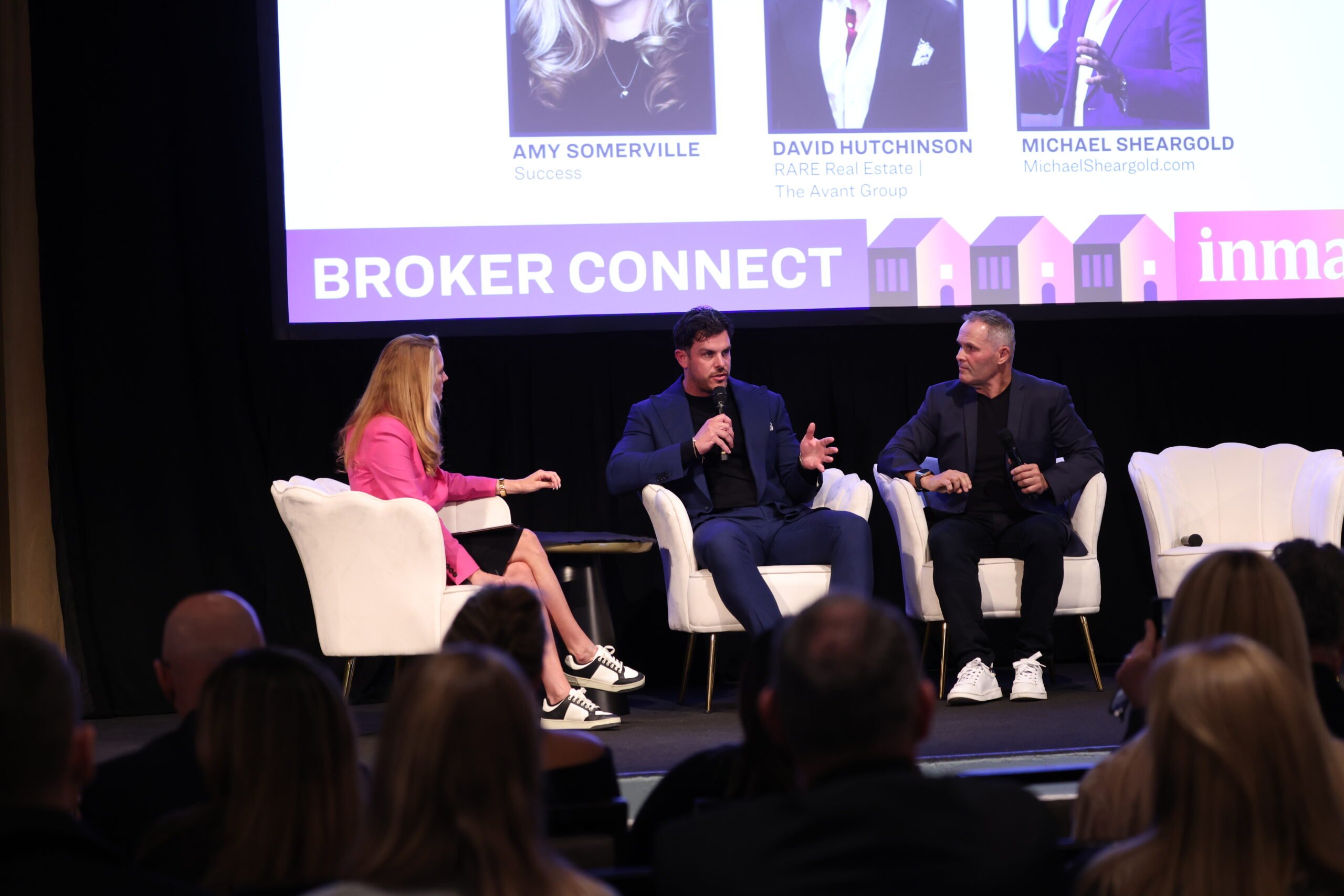Canada has shorter mortgage terms, which are now forcing people to move. Meanwhile in Australia, most buyers don’t even use agents.
Inman Connect New York is LIVE this week! Experience the pulse of the real estate industry in person or join us from anywhere in the world — the future of real estate is unfolding now. Get your virtual ticket here.
Inman readers are generally familiar with the nuts and bolts of an American real estate transaction. Homes go up on multiple listing services (MLS), sellers pay commissions (at least for now) and agents then split those commissions.
But Tuesday afternoon at Inman Connect New York, a pair of agents from different countries shared the ways in which their markets differ from the U.S., and the differences are huge. While some foreign markets offer lessons in what the U.S. might do better, plenty of what goes on overseas might also make American agents happy for the way the system works at home.
Australia
Michael Sheargold is the head coach at his eponymous real estate coaching firm and spent his time on stage Tuesday explaining the stark differences between the U.S. and his home country of Australia.
Among other things, Sheargold said there is no MLS in Australia. That means agents go directly to one of the two big Australian portals to post listings, and the cost to get the listings up runs anywhere between $600 and $6,000.
However, the homeseller typically foots that bill, as they do for all the marketing costs involved in selling a home. In fact, Sheargold said sellers’ agents have to discuss three financial issues with their clients: the price of the home, the amount of commission that’ll be paid, and the amount the seller will spend on marketing.
According to Sheargold, this creates a somewhat different culture in Australia.
“In the U.S., we’re looking for the lowest amount we can spend on marketing,” he explained. “But in Australia, it’s a question of the highest exposure.”
Having sellers foot more of the marketing costs for a home sale may not sound like such a bad deal. But there’s also another big cultural difference between the U.S. and Australia, and it’s one American industry pros may not love: Buyers’ agents are quite rare.
“Maybe one in 40 transactions have a buyers agent,” Sheargold said.

From left to right, moderator Amy Somerville, David Hutchinson and Michael Sheargold at Inman Connect New York on Tuesday. Credit: AJ Canaria Creative Services
Canada
David Hutchinson, broker at RARE Real Estate in Toronto, Canada, shared the stage Tuesday with Sheargold. He said that his country often follows U.S. trends when it comes to real estate, though with a lag time of a few years. And he specifically indicated that he’d prefer it if Canada doesn’t start seeing the same commission lawsuits that are currently roiling the U.S.
Despite following similar trends, though, Hutchinson also said there are some significant differences between the U.S. and Canada — one of which is that in Canada, mortgages typically only last five years or less. The result of this different mortgage landscape is that many Canadians who obtained favorable rates a few years ago are now up for renewal, and are now staring down the barrel of much higher rates.
“A lot of people in the U.S. are not moving right now because they’re locked in,” Hutchinson noted, before pointing out that in Canada the opposite is happening right now thanks to mortgage renewals. “They don’t have a choice but to move.”
Hutchinson also said that another difference between the U.S. and Canada has to do with privacy laws. In the U.S., agents can run marketing campaigns using highly targeted data and social media tools — things that ensure their ads are reaching people who might want to see them.
In Canada, however, data laws make it harder to target interested consumers, which means that “we’re not able to run targeted ads,” Hutchinson said.
The result is that Canadian agents pay a lot for lower quality online leads compared to their American counterparts. And in Hutchinson’s case specifically, that has made online marketing less worth it in general.
“We tend to direct our money,” he said, “away from marketing and toward client retention.”
- SEO Powered Content & PR Distribution. Get Amplified Today.
- PlatoData.Network Vertical Generative Ai. Empower Yourself. Access Here.
- PlatoAiStream. Web3 Intelligence. Knowledge Amplified. Access Here.
- PlatoESG. Carbon, CleanTech, Energy, Environment, Solar, Waste Management. Access Here.
- PlatoHealth. Biotech and Clinical Trials Intelligence. Access Here.
- Source: https://www.inman.com/2024/01/23/you-wont-believe-how-different-these-foreign-markets-are/
- :has
- :is
- :not
- $UP
- 000
- 10
- 32
- 35%
- 40
- a
- Able
- Ads
- Agent
- agents
- ago
- All
- also
- American
- amount
- amy
- an
- and
- Another
- anywhere
- ARE
- AS
- At
- Australia
- Australian
- Bad
- BE
- before
- believe
- Better
- between
- Big
- Bill
- broker
- but
- buyers
- Campaigns
- CAN
- Canada
- Canadian
- Canadians
- case
- choice
- client
- clients
- coach
- coaching
- COM
- comes
- commission
- commissions
- compared
- Connect
- Consumers
- Cost
- Costs
- counterparts
- countries
- country
- creates
- Creative
- credit
- cultural
- Culture
- Currently
- data
- David
- deal
- differ
- difference
- differences
- different
- direct
- directly
- discuss
- do
- Doesn’t
- Dont
- down
- ensure
- estate
- Even
- experience
- explained
- explaining
- Exposure
- fact
- familiar
- favorable
- few
- financial
- Financial Issues
- Firm
- five
- following
- follows
- Foot
- For
- forcing
- foreign
- from
- future
- General
- generally
- get
- Go
- Goes
- Happening
- happy
- harder
- Have
- he
- head
- here
- higher
- highest
- highly
- his
- Home
- Homes
- How
- However
- HTTPS
- huge
- hutchinson
- if
- in
- indicated
- industry
- interested
- involved
- issues
- IT
- Jim
- join
- Join us
- jpg
- landscape
- Last
- Laws
- Leads
- least
- left
- less
- Lessons
- like
- listing
- Listings
- live
- locked
- looking
- Lot
- love
- lower
- lowest
- made
- make
- many
- Marketing
- Marketing Campaigns
- Markets
- max-width
- May..
- means
- Meanwhile
- Media
- Michael
- might
- MLS
- money
- more
- Mortgage
- Mortgages
- most
- move
- moving
- much
- multiple
- New
- New York
- no
- noted
- now
- obtained
- of
- offer
- often
- on
- ONE
- online
- Online Marketing
- only
- opposite
- or
- Other
- our
- out
- overseas
- paid
- pair
- Pay
- People
- person
- plato
- Plato Data Intelligence
- PlatoData
- Plenty
- Post
- prefer
- price
- privacy
- privacy laws
- PROS
- pulse
- quality
- question
- quite
- RARE
- Rates
- reaching
- readers
- real
- real estate
- Renewals
- result
- retention
- right
- Run
- runs
- s
- Said
- sale
- same
- see
- seeing
- Sellers
- Selling
- Services
- shared
- significant
- similar
- Social
- social media
- some
- somerville
- somewhat
- Sound
- specifically
- spend
- spent
- Stage
- stark
- start
- such
- system
- T
- Target
- targeted
- tend
- terms
- thanks
- that
- The
- The Future
- the world
- their
- Them
- then
- There.
- These
- they
- things
- this
- those
- though?
- three
- ticket
- time
- to
- tools
- toronto
- toward
- transaction
- Transactions
- Trends
- Tuesday
- two
- typically
- u.s.
- unfolding
- us
- use
- using
- Virtual
- want
- Way..
- ways
- we
- What
- when
- which
- while
- WHO
- will
- with
- Won
- works
- world
- worth
- years
- york
- you
- Your
- zephyrnet












